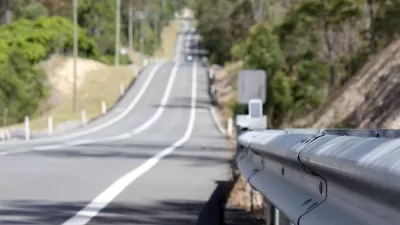Escalating gas prices are depressing, but look on the bright side: a new study shows that they may reduce annual traffic deaths by as much as one-third.
"Professors Michael Morrisey of the University of Alabama at Birmingham and David Grabowski of Harvard Medical School said they found that for every 10 percent increase in gas prices there was a 2.3 percent decline in auto deaths.
Their study looked at fatalities from 1985 to 2006, when gas prices reached about $2.50 a gallon. With gas now averaging more than $4 a gallon, Morrisey said he expects to see much greater drop - about 1,000 deaths a month."
He cautioned that their estimate of a decline of 1,000 deaths a month could be offset somewhat by the shift under way to smaller, lighter, more fuel-efficient cars and the increase in motorcycle and scooter driving...the "same kind of symmetry" between gas prices and auto deaths when prices go down.
'When that happens we drive more, we drive bigger cars, we drive faster and fatalities are higher,' he said.
Clarence Ditlow, executive director of the nonprofit Center for Auto Safety, said it makes sense that auto deaths would decline as driving decreases in response to rising gas prices.
There are a whole bunch of factors that are influenced by higher gasoline prices - teenagers don't have as much money, so you have the most risky drivers driving less; people are switching out of the bigger, older more dangerous vehicles, and people also know if they drive slower they're going to save gasoline," Ditlow said. 'So, from a societal viewpoint, higher gasoline prices have a great number of benefits, and one of the most important benefits is fewer traffic fatalities.'
Thanks to Gladwyn d'Souza
FULL STORY: Study: As gas prices go up, auto deaths drop

Alabama: Trump Terminates Settlements for Black Communities Harmed By Raw Sewage
Trump deemed the landmark civil rights agreement “illegal DEI and environmental justice policy.”

Study: Maui’s Plan to Convert Vacation Rentals to Long-Term Housing Could Cause Nearly $1 Billion Economic Loss
The plan would reduce visitor accommodation by 25% resulting in 1,900 jobs lost.

Planetizen Federal Action Tracker
A weekly monitor of how Trump’s orders and actions are impacting planners and planning in America.

Wind Energy on the Rise Despite Federal Policy Reversal
The Trump administration is revoking federal support for renewable energy, but demand for new projects continues unabated.

Passengers Flock to Caltrain After Electrification
The new electric trains are running faster and more reliably, leading to strong ridership growth on the Bay Area rail system.

Texas Churches Rally Behind ‘Yes in God’s Back Yard’ Legislation
Religious leaders want the state to reduce zoning regulations to streamline leasing church-owned land to housing developers.
Urban Design for Planners 1: Software Tools
This six-course series explores essential urban design concepts using open source software and equips planners with the tools they need to participate fully in the urban design process.
Planning for Universal Design
Learn the tools for implementing Universal Design in planning regulations.
Caltrans
Smith Gee Studio
Institute for Housing and Urban Development Studies (IHS)
City of Grandview
Harvard GSD Executive Education
Toledo-Lucas County Plan Commissions
Salt Lake City
NYU Wagner Graduate School of Public Service



























